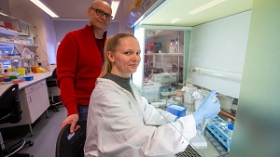Education and Science, Estonia, EU – Baltic States, Innovations, Medicine
International Internet Magazine. Baltic States news & analytics
Thursday, 01.01.2026, 19:11
Estonia: University of Tartu researchers develop test for determining COVID-19 antibodies
 Print version
Print version |
|---|
Antibodies develop in a person infected with COVID-19 within 14 to 28 days. By testing a person for these antibodies, it is possible to confirm their prior infection and determine if they have developed immunity to the coronavirus.
The method for the determination of SARS-CoV-2 antibodies was developed under the leadership of Part Peterson, professor of molecular immunology and head of the Department of Biomedicine of the Institute of Biological and Translational Medicine of the University of Tartu. According to him, the new method is simple and fast and would be suitable for analyzing hundreds of COVID-19 samples per day.
Antibodies were determined using the Laser Induced Plasma Spectroscopy (LIPS) method, which has the advantage of measuring antibody binding to SARS-CoV-2 proteins in a naturally close form. According to Peterson, LIPS would be suitable for assessing antibodies in the blood plasma of at-risk groups, such as medical staff and care home residents and staff.
"An antibody test working with that method is a forerunner from the University of Tartu," Peterson said. "Of course, we currently have too few samples and we need to analyze the blood plasma of a hundred or two hundred people who have recovered from COVID-19 to get a better picture. This is work that will be done in cooperation with partners in the near future, and, of course, new blood tests will also need the permission of the Ethics Committee," he added.
Peterson said he hopes that other antibody tests will soon become available and comparable. There are also rapid tests on the market today, data regarding the accuracy of which is still limited.
The development of the method was aided by the laboratory group of the Department of Biomedicine of the Institute of Biological and Translational Medicine of the University of Tartu, including Liis Haljasmagi, Anu Remm, Hanna Sein and Kai Kisand. Peterson also expressed his thanks to Anu Tamm from the University of Tartu Hospital and Andres Mannik and Mart Ustav from the company Icosagen. "Without everyone's help, we would not have been able to get this method to work so quickly," Peterson said.
- 26.08.2021 LLC Dizozols Investments finalizes investment attraction deal with Crowdestor with record-high profits
- 30.12.2020 Business Education Plus предлагает анонсы бизнес-обучений в январе-феврале 2021 года
- 30.12.2020 Hotels showing strong interest in providing self-isolation service
- 30.12.2020 EU to buy additional 100 mln doses of coronavirus vaccine
- 30.12.2020 ЕС закупит 100 млн. дополнительных доз вакцины Biontech и Pfizer
- 29.12.2020 В Латвии вводят комендантский час, ЧС продлена до 7 февраля
- 29.12.2020 Latvia to impose curfew, state of emergency to be extended until February 7
- 29.12.2020 Linde Gas открывает завод в Кедайняйской СЭЗ
- 29.12.2020 В Риге можно изолироваться в трех гостиницах
- 29.12.2020 18-19 января Наталия Сафонова проводит семинар "Управленческий учет во власти собственника"








 «The Baltic Course» Is Sold and Stays in Business!
«The Baltic Course» Is Sold and Stays in Business!

